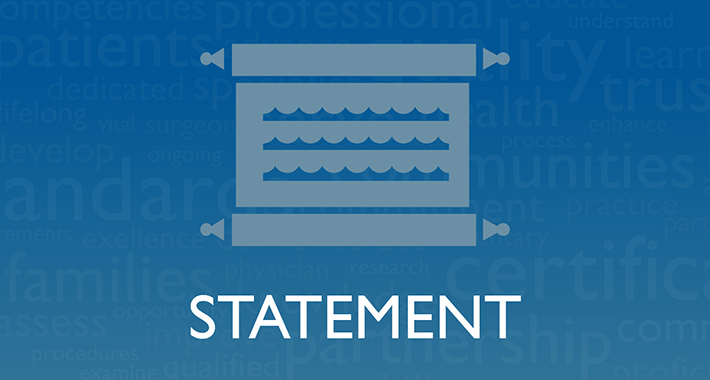
Board certification matters. It has been a hallmark of public and professional trust for the past century and is so today.
But make no mistake. The need to demonstrate professionalism, lifelong learning, assessment, patient safety, and quality improvement – the values that certification represents – does not end with initial certification.
We all want medicine to remain a highly regarded, trusted profession. Self-regulation to ensure the highest level of professionalism is an essential element if we are to maintain that standing. That’s what certification has been for almost a century. We are determined that this will always be true. It is our responsibility to our profession and the public we serve.
That is why ABMS remains fully committed to all of the elements of MOC.
MOC is the evolution of what certification means to our profession. It is a comprehensive process that incorporates our commitment to professionalism, lifelong learning and self-assessment, measures of knowledge, judgment, and skills, and ongoing improvement in medical practice. MOC is too important to our nation’s patients, our profession and our health care system to let it be dismantled or watered down.
More than a decade ago, the ABMS Member Board community agreed that the board certification credential could not remain relevant and trustworthy without a rigorous system of continuing education and ongoing assessment. Through an extensive and inclusive collaboration with physicians and other stakeholders, we developed Standards for ABMS Programs for MOC. The standards provide a framework to ensure that the values of lifelong learning, patient safety and practice improvement are translated into day-to-day physician practices.
These ideals are key elements in what the Board Certification credential represents.
We recognize that some parts of the MOC process have been questioned, and we’re keenly aware of the concerns within the physician and Member Board community.
While all ABMS Member Boards are expected to meet all the Standards of MOC, the ABMS does not dictate how the Member Boards implement those Standards. Flexibility and balance are essential in a profession as complex and diverse as medicine, and our Boards are working to ensure that their requirements are relevant and meaningful to their specialist diplomates. That flexibility is carried out within the framework that the Member Boards have already agreed to. The standards expect the boards to listen to participants, to improve their processes, and to deliver real value to physicians. Each board determines its own way to deliver on certification’s core values.
The profession has invested tremendous time and talent in developing a system that providers, payers and – most important – patients and families can rely on, and we’ve worked tirelessly to help them see the value of board certification. If we allow ourselves to whittle away at the values behind certification, we also chip away at the trust we’ve worked so hard to earn.
Consider the perspective of Susan Dentzer, senior policy adviser to the Robert Wood Johnson Foundation and ABMS Board of Directors Public Member:
“The American public relies on the medical profession to ensure that the physicians they trust are taking every step to practice high quality, up to date care. The public needs to know that there are systems in place keeping physicians accountable to their lifelong commitment to continuous learning and quality improvement. That is the value of MOC. Although there may be legitimate debate within the medical community about the exact form and content of MOC processes, a responsible approach to that debate would be to say ‘let’s mend it, not end it.’”
Let’s take to heart the words of Ms. Dentzer. Let us reiterate our commitment to ABMS Board Certification, MOC and the values they represent.
-
Read More:
- Statements |
